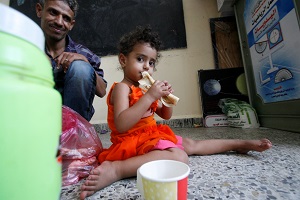Malnutrition amongst children in Yemen at an all-time high, warns UNICEF
Nearly 2.2 million children in Yemen are acutely malnourished and require urgent care. At least 462,000 children suffer from Severe Acute Malnutrition (SAM), a drastic increase of almost 200 per cent since 2014. An additional 1.7 million children suffer from Moderate Acute Malnutrition.

While finding water is a daily struggle for most family, food is equally difficult to source. As thousands of people lost their homes and their sources of income, they also became unable to properly feed their children.
The situation of severely malnourished children in Governorates such as Hodeida, Sa’ada, Taizz, Hajjah and Lahej is most critical. These five governorates put together have the highest of all SAM cases in the country. Sa’ada also has the world’s highest stunting rates amongst children with an unprecedented eight out of 10 children in some areas being chronically malnourished.
“Malnutrition in Yemen is at an all-time high and increasing,” said Dr Meritxell Relano, UNICEF Acting Representative in Yemen. “The state of health of children in the Middle East’s poorest country has never been as catastrophic as it is today.”
Even before the escalation of the conflict in March 2015, Yemen faced challenges from widespread poverty, food insecurity and a dearth of health services. Now Yemen’s health system is on the verge of collapse.
Less than a third of the country’s population has access to medical care. Less than half of health facilities are functional. Health workers have not been paid their wages for months and aid agencies are struggling to bring in lifesaving supplies because of the political deadlock between the warring parties.
At least one child dies every ten minutes in Yemen because of preventable diseases such as diarrhoea, malnutrition and respiratory tract infections.
“Violence and conflict have reversed significant gains made in the last decade in the health and nutrition of Yemeni children. Diseases such as cholera and measles have spread and, with few health facilities functional, such outbreaks are taking a heavy toll on children,” said Relano.
In 2016, UNICEF has supported the treatment of 215,000 children suffering from SAM across Yemen and provided more than 4 million children under the age of five with vitamin supplements to boost their immunity. But this lifesaving work remains hindered by the shortage of funding and limited access to areas caught in the fighting.
“We call on parties to the conflict to give us unhindered access to children in need across the country so we are able to deliver nutrition supplies, treat malnourished children and support Yemen’s health services,” said Relano.
Funding continues to be a challenge. In 2017, UNICEF needs US$70 million to provide the much needed nutrition services to mothers and children across the country.
Source:United Nations Children's Fund
- 278 reads
Human Rights
Fostering a More Humane World: The 28th Eurasian Economic Summi

Conscience, Hope, and Action: Keys to Global Peace and Sustainability

Ringing FOWPAL’s Peace Bell for the World:Nobel Peace Prize Laureates’ Visions and Actions

Protecting the World’s Cultural Diversity for a Sustainable Future

Puppet Show I International Friendship Day 2020

